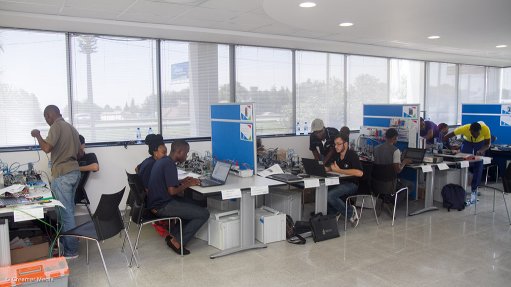
MECHATRONICS SKILLS COMPETITION
Students and apprentice artisans compete against each other to build industrial mechantronic systems
Photo by: Duane Daws
Skills competitions that test new apprentices’ and artisans’ skills in a competitive environment are highly effective forums to enable industry, education and government to engage one another on matters such as training and curriculum.
The skills competition held in South Africa in November to select competitors for the World Skills South Africa finals to be held in Cape Town, and the international competition thereafter in Brazil, organised by industrial control and automation company Festo, saw the participation of technical and vocational training college students, as well as apprentices from industrial companies in South Africa.
“One of the most powerful things about this World Skills competition is that it enables educators and industry to benchmark their training directly against that of other institutions and companies from around the world, based on real industrial design challenges and best practices.
“This interaction between lecturers, technical employees in industry and government officials is a very powerful tool to improve the continuity between training and the skills required by industry,” says Festo Didactic manager Horst Weinert.
For example, the competition tested the students on mechatronics, which is a rapidly developing branch of industrial engineering focused on converged mechanical and electronic systems.
“This discipline is quite new and is mainly driven by industry, particularly the automotive sector with their high-technology production lines. However, the lecturers participating in the competition are the core mechatronics lecturers in South Africa.
“This means the competition is a highly effective interface between industry and education that enables the continuous discourse between industry and training organisations required to improve the quality of education and the competitiveness of our industrial skills.”
However, it is the additional conversations held on the sidelines between participants and lecturers, from industry training centres and colleges, which is where a significant portion of the engagement and comparative benchmarking takes place.
“One of the most powerful effects of such a skills competition is seeing trainers engaging each other informally. They discuss the focuses of their curricula, their approaches to specific topics or preparations for trade tests, as well as to ask technical questions of the industry participants and sponsors, such as Festo in this case.”
The winners of the competition were students Victor Hlaise and Tressure Mokgohloa from Tshwane North College, who trained over weekends with their lecturer, Xaccheus Seema. They will now take part in the national competition finals in Cape Town this month, with an aim to represent South Africa at the World Skills competition later in the year.
This sharing of ideas between lecturers, industry experts and government officials, as well as the enthusiasm that the lecturers and their students show when participating in such international skills competitions – many train voluntarily in their own time – provides a powerful platform to improve industrial training and competitiveness, says Weinert.
Further, industrial skills competitions are increasingly seeing industrial companies participating.
“[Automotive major] BMW participated in the South Africa World Skills competition and everyone recognises the brand,”
notes Weinert.